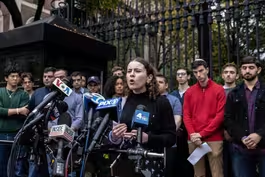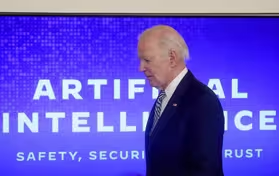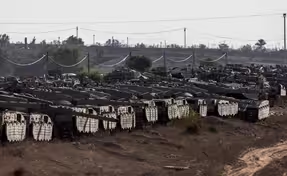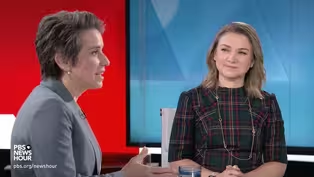
Military experts weigh in on Israel's ground invasion
Clip: 10/30/2023 | 9m 8sVideo has Closed Captions
Military experts weigh in on Israel's tactics in Gaza airstrikes and ground invasion
Israel is now operating in the Gaza Strip, but a U.S. official says IDF ground invasion plans changed to use more “methodical” tactics compared to original plans. But still, Israel’s air campaign has been relentless, turning parts of Gaza into moonscapes. Nick Schifrin discussed more with retired IDF Maj. Gen. Yaakov Amidror and Frederic Wehrey of the Carnegie Endowment for International Peace.
Problems playing video? | Closed Captioning Feedback
Problems playing video? | Closed Captioning Feedback
Major corporate funding for the PBS News Hour is provided by BDO, BNSF, Consumer Cellular, American Cruise Lines, and Raymond James. Funding for the PBS NewsHour Weekend is provided by...

Military experts weigh in on Israel's ground invasion
Clip: 10/30/2023 | 9m 8sVideo has Closed Captions
Israel is now operating in the Gaza Strip, but a U.S. official says IDF ground invasion plans changed to use more “methodical” tactics compared to original plans. But still, Israel’s air campaign has been relentless, turning parts of Gaza into moonscapes. Nick Schifrin discussed more with retired IDF Maj. Gen. Yaakov Amidror and Frederic Wehrey of the Carnegie Endowment for International Peace.
Problems playing video? | Closed Captioning Feedback
How to Watch PBS News Hour
PBS News Hour is available to stream on pbs.org and the free PBS App, available on iPhone, Apple TV, Android TV, Android smartphones, Amazon Fire TV, Amazon Fire Tablet, Roku, Samsung Smart TV, and Vizio.
Providing Support for PBS.org
Learn Moreabout PBS online sponsorshipGEOFF BENNETT: As we reported, Israel is now advancing into Gaza Strip, but should it pursue more limited goals that avoid causing even more civilian casualties?
Nick Schifrin picks up our coverage from here.
NICK SCHIFRIN: Geoff, a U.S. official tells me that Israel's ground invasion plans -- quote -- "changed" to use -- quote -- "more methodical tactics," compared to their original plans.
President Biden and U.S. military officials with experience fighting in urban environments, such as Mosul against ISIS, have been urging Israel to think through the consequences of their actions, not only on Gazans, but also on efforts to release 230 hostages, deliver humanitarian aid, and prevent regional war.
As of now, we have seen relatively limited Israel ground incursions into Gaza in at least three places, the northwest and northeast corners and Central Gaza.
But Israel's air campaign has been relentless, turning parts of Northern Gaza into moonscapes.
For more on this, we get two perspectives.
Retired Major General Yaakov Amidror was national security adviser to Israeli Prime Minister Benjamin Netanyahu after a 36-year career in the Israeli Defense Force.
He's now a distinguished fellow at the Jewish Institute for National Security of America.
And Frederic Wehrey had a 20-year career in the U.S. Air Force focused on the Middle East.
He's now a senior fellow at the Carnegie Endowment for International Peace.
Thank you very much to both of you.
Welcome to "PBS NewsHour."
Yaakov Amidror, let me start with you.
Do you see different tactics in Israel's ground invasion so far in these early days than, one, Israel indicated they might be, but also different tactics than Israel has used in the past?
MAJ. GEN. YAAKOV AMIDROR (RET.
), Former Israeli National Security Adviser: The tactics that we are using now are the tactics that had been learned for many years.
I'm sure that, with some experts from America, which have more experience in urban area like Fallujah in Mosul, it will not be one can go into -- immediately into the center of Gaza.
It will be more forces around it and slowly, slowly squeeze in.
And we are using the superiority in firepower to do it slowly.
And whenever there is a need, we know to stop, to use the air force, the artillery and other tools that we have.
So, in a way, we have time, and we are using it for minimizing the number of casualties in our side and to reduce the number of civilians that might be killed if we will rush in with huge forces.
NICK SCHIFRIN: Frederic Wehrey, is that what you see, a kind of slow operation from the IDF to try and avoid both Israeli casualties, but also civilian casualties in Gaza on the ground?
LT. COL. FREDERIC WEHREY (RET.
), U.S. Air Force: Well, it certainly seems to be deliberate and gradualist from the Israeli perspective.
And, again, they're avoiding committing all their forces at once.
You have to remember they need to prepare the battlefield in terms of gathering intelligence.
They're incredibly concerned about the difficulty of this urban environment.
And we have to talk about the tunnel infrastructure.
Hamas is deeply entrenched underground, and that's a very difficult environment.
They are, I think, also concerned about scaling this operation to avoid giving Hezbollah and Iran a pretext to escalate.
But, again, as you mentioned, the airstrikes have been anything but gradualist.
I mean, they have been devastating, relentless.
And, of course, civilians have paid a huge toll for this indiscriminate bombing.
And I will just add the sort of gradual squeezing, what we're talking about is a siege, really.
NICK SCHIFRIN: My colleague Leila Molana-Allen asked Minister for Strategic Affairs Ron Dermer about this very topic, about Israeli military actions in Gaza.
This is what he said earlier today.
RON DERMER, Israeli Minister for Strategic Affairs: Israel had to come up with a battle plan in a very short amount of time.
So, in the process that we're coming up with our battle plan, we're also having American input into it.
So they have been part of that process.
So we're in a theater now where you have many, many fewer civilians there, and that's enabled us to minimize civilian casualties and focus on killing the terrorists, which we are doing.
NICK SCHIFRIN: Yaakov Amidror, is that what you see, that there was no battle plan for invading Gaza, and Israel is trying to reduce civilian casualties by moving that population south?
MAJ. GEN. YAAKOV AMIDROR: The -- we are asking the population of North Gaza to move to the south, an area which was designated as safe haven.
And the majority of the population moved to this area.
Hamas is doing everything to stop the people from being evacuated themselves into this area.
And Hamas is doing everything to maximize the number of civilians that will be killed in the Palestinian side, because this is the -- allow him to apply to the international media, to the international community, saying that civilians are suffering from the Israeli attack.
We never had in mind a need to reconquer Gaza.
We understood that we have to deal with Hamas.
And only after the 7th of October, when we understood that this is something which the organization is barbarian, we decided that this operation will be unlike all the other operations in the Gaza Strip.
It will be a one in which we will go after the Hamas and distract it inside Gaza.
And for that, you have to occupy the vast majority of the Gaza Strip.
You want to destroy Hamas completely.
It will not exist as a military organization anymore, not in Gaza and not anywhere else.
And we will do whatever is needed for that.
NICK SCHIFRIN: Frederic Wehrey, you hear the goals there.
Israeli officials have been very clear, eliminate Hamas' ability to launch any kind of military operation, but also eliminate Hamas' political ability to run Gaza.
Do you believe Israel can accomplish those goals?
LT. COL. FREDERIC WEHREY: No, to put it bluntly.
I mean, this is the stated objective.
It's emotionally satisfying.
We have to recall the tenor of the moment.
There's a desire for revenge.
There's obviously political considerations for the prime minister, Israeli prime minister, to do something for his own political survival.
But you're talking about eradicating a deeply entrenched movement, a social entity, an entity that has its grip over Gaza.
And so I think the end state will not be the complete elimination, but some variation of this where Israel can claim a modicum of success.
And I do want to emphasize here that the real center of gravity for this threat to Israel is not Hamas, per se.
It's not Hamas' infrastructure, missiles, support from Iran, the tunnels.
It's really the problems of Gaza, the occupation, and that's not going to be resolved militarily.
NICK SCHIFRIN: Yaakov Amidror, do you think this can be resolved militarily?
Respond to what Fred Wehrey just said.
MAJ. GEN. YAAKOV AMIDROR: I don't agree, not about the facts and not about the consequences.
Gaza is not under occupation.
And I don't agree about the consequences.
If we will be in Gaza, we will kill Gaza -- we will kill the majority of the commanders, if not all of them.
We will destroy all the facilities which belong to Hamas.
Of course, Hamas is an organization with charity and schools might remain in Gaza, but no any ability to attack Israel.
And Israel is not leaving in the area.
None of its military capability will be revived after the operation, after the war in Gaza, because we will not let it happen.
NICK SCHIFRIN: Frederic Wehrey, given that determination that you just heard from Israel, what are the consequences for how long this war will last and how difficult it will be?
LT. COL. FREDERIC WEHREY: Well, Israeli officials recently said that this could be a yearlong operation.
I mean, you're looking at something much longer if it proceeds in the way that it's been described by your guest.
I mean, you're looking at regime change and occupation.
And history shows that that doesn't work out well, that once organizations are decimated, something emerges to take their place.
And so we're talking about a massive problem.
And I think it's very easy to focus on the infrastructure, to talk about reducing capability.
But it's quite another to talk about replacing an entire governance structure in this tremendously problematic area that has been a wellspring for grievances and radicalization.
NICK SCHIFRIN: Frederic Wehrey, Yaakov Amidror, thank you very much to you both.
MAJ. GEN. YAAKOV AMIDROR: Thank you very much for the opportunity.
ADHD medication shortage strains patients and families
Video has Closed Captions
Clip: 10/30/2023 | 8m 59s | How the prolonged ADHD medication shortage is straining patients and their families (8m 59s)
Antisemitic threats on college campuses increase amid war
Video has Closed Captions
Clip: 10/30/2023 | 6m 27s | Israel-Hamas war leads to increase of antisemitic threats on college campuses (6m 27s)
Biden signs order to manage artificial intelligence risks
Video has Closed Captions
Clip: 10/30/2023 | 6m 27s | Biden signs order establishing standards to manage artificial intelligence risks (6m 27s)
More Israeli tanks enter Gaza as Netanyahu rejects ceasefire
Video has Closed Captions
Clip: 10/30/2023 | 9m 51s | More Israeli tanks roll into Gaza as Netanyahu says ceasefire 'will not happen' (9m 51s)
Tamara Keith and Amy Walter on presidential race shakeups
Video has Closed Captions
Clip: 10/30/2023 | 8m 18s | Tamara Keith and Amy Walter on the latest shakeups among GOP presidential contenders (8m 18s)
Providing Support for PBS.org
Learn Moreabout PBS online sponsorship
- News and Public Affairs

FRONTLINE is investigative journalism that questions, explains and changes our world.

- News and Public Affairs

Amanpour and Company features conversations with leaders and decision makers.












Support for PBS provided by:
Major corporate funding for the PBS News Hour is provided by BDO, BNSF, Consumer Cellular, American Cruise Lines, and Raymond James. Funding for the PBS NewsHour Weekend is provided by...




